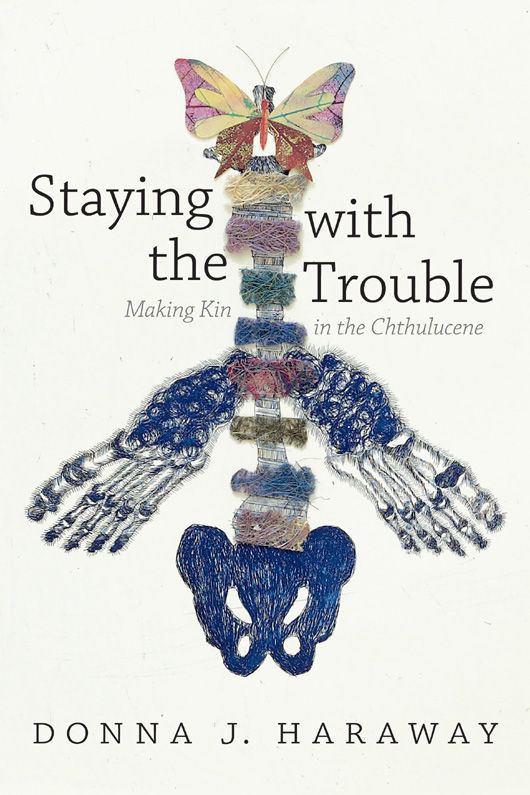Donna J. Haraway: Staying with the Trouble: Making Kin in the Chthulucene (2016)
Filed under book | Tags: · anthropocene, biology, capitalism, capitalocene, chthulucene, environment, feminism, human, human ecology, multispecies, nature

“In the midst of spiraling ecological devastation, multispecies feminist theorist Donna J. Haraway offers provocative new ways to reconfigure our relations to the earth and all its inhabitants. She eschews referring to our current epoch as the Anthropocene, preferring to conceptualize it as what she calls the Chthulucene, as it more aptly and fully describes our epoch as one in which the human and nonhuman are inextricably linked in tentacular practices. The Chthulucene, Haraway explains, requires sym-poiesis, or making-with, rather than auto-poiesis, or self-making. Learning to stay with the trouble of living and dying together on a damaged earth will prove more conducive to the kind of thinking that would provide the means to building more livable futures. Theoretically and methodologically driven by the signifier SF—string figures, science fact, science fiction, speculative feminism, speculative fabulation, so far—Staying with the Trouble further cements Haraway’s reputation as one of the most daring and original thinkers of our time.”
Publisher Duke University Press, 2016
Experimental Futures series
ISBN 9780822373780, 0822373785
xv+296 pages
Talk (video, 25 min, 2014)
Interview with author: Lauren O’Neill-Butler (Artforum, 2016).
Reviews: Archie Davies (Antipode, 2016), Matt Thompson (Savage Minds, 2016), Ingrid M. Hoofd (Feminist Review, 2017), Devin Proctor (Anthropological Quarterly, 2017), Danya Glabau (J Cultural Economy, 2017), Oliver Basciano (ArtReview, 2017), Ben Denham (Sydney Review of Books, 2017), Juan Guevara (Space and Culture, 2018), Gyrus (Dreamflash, 2018), Luis Campos (Quarterly Review of Biology, 2018), Kaisa Kortekallio (European Journal of Women’s Studies, 2019), Irene Wolfstone (Imaginations, 2019), Thierry Hoquet (Critique, 2019, FR), Doortje Hörst (Junctions, 2019).
HTML (removed on 2017-5-17 upon request from publisher)
Comment (0)Lucie Vágnerová: Sirens/Cyborgs: Sound Technologies and the Musical Body (2016)
Filed under thesis | Tags: · body, cyborg, electronic music, feminism, gender, music, sound art, technology, women
“This dissertation investigates the political stakes of women’s work with sound technologies engaging the body since the 1970s by drawing on frameworks and methodologies from music history, sound studies, feminist theory, performance studies, critical theory, and the history of technology. Although the body has been one of the principal subjects of new musicology since the early 1990s, its role in electronic music is still frequently shortchanged. I argue that the way we hear electro-bodily music has been shaped by extra-musical, often male-controlled contexts. I offer a critique of the gendered and racialized foundations of terminology such as “extended,” “non-human,” and “dis/embodied,” which follows these repertories. In the work of American composers Joan La Barbara, Laurie Anderson, Wendy Carlos, Laetitia Sonami, and Pamela Z, I trace performative interventions in technoscientific paradigms of the late twentieth century.
The voice is perceived as the locus of the musical body and has long been feminized in musical discourse. The first three chapters explore how this discourse is challenged by compositions featuring the processed, broadcast, and synthesized voices of women. I focus on how these works stretch the limits of traditional vocal epistemology and, in turn, engage the bodies of listeners. In the final chapter on musical performance with gesture control, I question the characterization of hand/arm gesture as a “natural” musical interface and return to the voice, now sampled and mapped onto movement. Drawing on Cyborg feminist frameworks which privilege hybridity and multiplicity, I show that the above composers audit the dominant technoscientific imaginary by constructing musical bodies that are never essentially manifested nor completely erased.”
PhD Dissertation
Publisher Graduate School of Arts and Sciences, Columbia University, 2016
Advisor: Ellie M. Hisama
242 pages
Diary of a Conference on Sexuality (1982)
Filed under booklet | Tags: · feminism, gender, sex, sexuality, theory

“Diary of a Conference on Sexuality is a conference program booklet designed by Hannah Alderfer, Beth Jaker, and Marybeth Nelson and published in conjunction with the ninth “Scholar and the Feminist” conference, “Towards a Politics of Sexuality,” held at Barnard College on April 24, 1982. Better known as the Barnard Sex Conference, the conference was a key event in the feminist sex wars of the 1980s. Organized by Carole Vance to explore the politics of sexuality, the conference was picketed by antipornography groups. While these protesters focused their objections on issues of pornography, S/M, and butch/femme, the conference addressed a much wider array of questions about women’s experiences of sexuality, some of which are represented here.
No ordinary conference program, the Diary included Vance’s invitation to presenters, a coauthored “Concept Paper” that described the conference’s aims and guiding questions, a list of speakers and schedule of events, as well as minutes from planning meetings, bibliographies of suggested reading, and a page devoted to each workshop. The Diary was, as Gayle Rubin later wrote, “intended to be something of an archival document.” Each speaker created a page in the Diary to represent her workshop; many of these included a “postcard” featuring some image that she found meaningful personally or in the context of the workshop. These images added to the visual impact of the program. With its striking images, its combination of politics, scholarship, and personal reflection, and its moments of insight, polemic, and humor, the Diary remains a compelling record of feminist collaboration.
In the days leading up to the conference, members of antipornography groups contacted the Barnard administration and issued a warning about what they saw as the “antifeminist” nature of the proceedings. In response, Barnard administrators confiscated 1,500 copies of the Diary two days before the conference. Despite subsequent reprinting, the Diary remains exceedingly rare.” (Heather Love, 2011)
Edited by Hannah Alderfer, Beth Jaker, and Marybeth Nelson
Publisher Faculty Press, New York, 1982
72 pages
via Dark Matter Archives
Commentary: Carole S. Vance (1984), Gayle Rubin (GLQ 2011).
PDF, PDF (18 MB)
See also conference proceedings (Pleasure and Danger, ed. Carole S. Vance, 1984, 462 pp)

